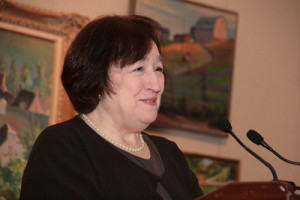Due to a scheduling conflict, Helen Vendler was unable to do an interview on “Day by Day” this week, as originally planned. But she has already said plenty about the book. In fact, she was the critic the New York Times Book Review turned to for a review back in 1977. Her review is not available online, but grateful acknowledgement is made to the Times for allowing us to quote from it here.
Vendler says the volume continues Lowell's attempt “to dismember and reconstitute the English lyric,” and then proceeds to say how by way of a brief tutorial on the tradition:
“Writers have used lyric verse to write oratory, diaries, prophecies, natural history, philosophy, and theology. Since Lowell is using it to write autobiography, we expect from him what we shall ask of all literary autobiographies — subjectivity, vivid self-presentation, subtlety of analysis and some detachment (whether scientific or ironic)). On these counts alone Lowell ranks very high. He has largely given up one of the most solacing aspects of conventional lyric — that transcending of past and future in favor of an intense present moment of love, or grief, or happiness. Lowell forces us to read the emotions of the moment in the knowledge of emotions past and anticipated. Nothing is unshadowed; nothing is forgotten; no moment but reaches out to another on the farther shore. The burden of reading “Day by Day” comes from this weight of autobiography everywhere pervading a verse which is itself, paradoxically enough, almost transparent.”
This raises an interesting issue about how much a reader knows in order to follow the narrative embedded within these poems. Vendler gives a brief overview of just a few of these points:
“Stealing like the tide over facts of feeling and of life, Lowell’s verse presses forward in obedience to that warning spoken by perception, the artist’s only conscience. There is no use denying that these poems, like Lowell’s historical or political or literary ones, needs footnoting. One has to know (from his previous work) his reading, his past and present; and one has to reconstruct the scenario behind this book – Lowell’s life in Kent, his hospitalization in England, his wife’s sickness, their temporary stay in Boston, their separation, a reconciliation, a further rapture, a parting, in Ireland, Lowell’s return to America. These episodes and others are the basis for the poems, but Lowell is more intent on sustained narrative than he was in “Notebook.”


